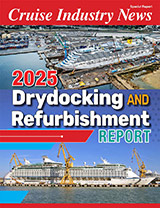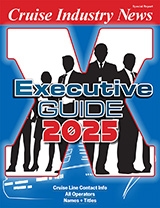Cargo and cruise industry representatives today urged Florida lawmakers to reform the state’s outdated harbor pilot system, saying reforms could be made while keeping Florida’s maritime industry safe and competitive.
Appearing before the Senate Committee on Transportation and Economic Development Appropriations, Florida Alliance of Maritime Organization (FAMO) representatives Jennifer Nugent-Hill of Tropical Shipping and Greg Purdy of Celebrity Cruises also endorsed a recent state study that found numerous flaws in the system that regulates and compensates the state’s 94 pilots. The study was conducted by the Office of Program Policy Analysis and Government Accountability (OPPAGA).
“Florida is home to 14 seaports, making it a world-leader in the maritime industry, international trade and a global cruising hub,” said Nugent-Hill, FAMO Vice President and Assistant Vice President of Public and Governmental Affairs for Tropical Shipping. “To remain competitive with other states we must improve the efficiency of our seaports and implement cost-competitive strategies. ”
“In 2008 alone, inflated harbor pilot costs accounted for $50 million in fees – born by cargo and cruise operators – to be paid to the less than 100 pilots,” Nugent-Hill said. “That’s just over 90 individuals receiving $50 million dollars in fees. Ultimately, these costs are passed along to consumers who purchase goods transported through Florida’s ports or vacationers who cruise through state waters. “
Nugent-Hill told the committee that safe navigation in ports and harbors “is a top priority for everyone in the maritime industry.” She added that opening the harbor pilot system to allow market competition for a larger pool of well-qualified professional pilots would not undermine safety, as some have said.
“We favor breaking up the monopoly to provide for more pilots in Florida – we need to be creating more jobs, not eliminating them. New pilots would and should be subject to the same stringent professional and experience standards,” she said.
Currently in Florida, most ships (non-U.S. registered cargo and passenger vessels and U.S. flag vessels not engaged in coastal trade) are required by law to obtain the services of a state-licensed harbor pilot when entering or leaving any of Florida’s seaports. First enacted in 1975, Chapter 310 of Florida statutes tasked the Department of Business and Professional Regulation (DBPR) with regulating the state’s approximately 94 harbor pilots.
“Today’s mariners benefit from advanced training and substantial technological improvements, allowing them to become highly trained specialists,” Purdy said, Vice President of Marine Operations for Celebrity Cruises and a former commanding officer of a Coast Guard cutter. “From GPS to electronic charts and digital radar systems, today’s shipboard technology provides captains a dramatically improved perspective on vessel position, hazards and relative motion of other ships. Compared to the ship captains, harbor pilots have a general working knowledge of the operations of these systems. This translates to the need for pilots to often operate at the lowest common denominator, failing to take advantage of the state-of-the-art safety systems installed on our ships.”
“If either of us sitting before you this morning thought the modernization and reform of today’s harbor pilot system would jeopardize the safety of our passengers and crews, and the ports we call upon, we would not be here endorsing the findings of the OPPAGA study and asking the Legislature to bring needed change,” Purdy concluded.
A full fact sheet on the Office of Program Policy Analysis and Government Accountability (OPPAGA) report can be found at www.FloridaMaritimeAlliance.com.



